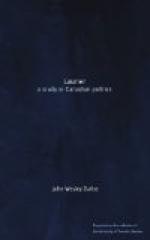But the task of attempting political reconstruction in a new world was not imposed upon Laurier. The signing of the armistice was the signal for the release of new forces; it was a great turning point in the world’s history. But for Laurier the tale of his years was told. There was something fitting in the departure of the veteran with the turning of the tide. He had been a mere survival on the scene following the elections of 1917 which put into the hands of the Union government a mandate to “carry on” for the remainder of the war—which at that time gave promise of stretching out interminably. That election set bounds to his ambitions, wrote finis to his political career. “Unarm; the long day’s work is o’er.” He continued to hold his rank in a party which waited upon events, knowing that the task of rebuilding and reconstruction must fall to younger hands. The serenity of mind which had sustained him in all the changes of a long and varied life did not desert him; and he looked forward with fortitude to the end now approaching. He had come a long way from the humble beginnings in St. Lin, 77 years before. Childhood; happy, carefree boyhood; a youth of gallant comradeship with the young swordsmen of a fighting political army; the ardors of a career in the making full of delights of battle with his peers; the call to the command; the conquest of the premiership; the long, crowded, brilliant years of office with their deep anxieties, crushing responsibilities, great satisfactions, substantial achievements; the bitterness of unexpected defeat; the gallant fight to win back to power ending by a stroke of fate in disaster; the final disruption of his party and the loss of old friends who had followed him in victory or defeat; these recollections must have been much in his mind during this year of afterglow. The end was fitting in its swiftness and dignity. No lingering, painful illness, but a swift stroke and a happy release. “Nothing is here for tears; nothing to wail.”



